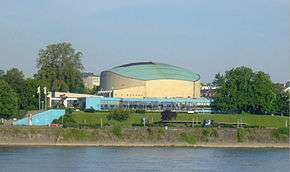Beethovenfest
| Beethovenfest | |
|---|---|
 The Beethovenhalle where most concerts take place | |
| Genre | mostly music by Beethoven |
| Frequency | annual |
| Location(s) | Bonn and the region |
| Inaugurated | 1845 |
| People | Nike Wagner |
| Website |
www |
The Beethovenfest (Beethoven Festival) is a festival of classical music in Bonn, Germany, dedicated mostly to the music of Ludwig van Beethoven who was born there. It dates back to 1845, when the composer's 75th anniversary of birth was celebrated with unveiling his monument and performing major works.
First held irregularly, it is now an annual event, presenting around 70 concerts of international orchestras, ensembles and soloists in more than 20 venues in the town and the region.
History
The Beethovenfest was first held in 1845, when a festival of three days celebrated the 75th anniversary of the composer's birth. The Beethoven monument was unveiled on 12 August 1845 as part of the festivities, which were attended by the Prussian king Friedrich Wilhelm IV, the British Queen Victoria, Alexander von Humboldt, and Hector Berlioz.[1] Among the conductors then were Franz Liszt and Louis Spohr, who conducted the Missa solemnis and the Ninth Symphony.[2] In 1894, all nine symphonies were performed for the first time.
From 1931 the festival was held annually, soon taken over by the Nazis. After World War II, the town took responsibility for the festival. From 1947, it was held biennially, with chamber music performed the other years. The present Beethovenhalle, which followed two wooden structures of the same name, was opened in 1959 and made the festival one of the important international festivals.[3] From 1974, the festival was held every third year, and music by Beethoven was contrasted with contemporary music.
From 1998, the town organized the festival, now annually, in collaboration with the broadcaster Deutsche Welle.[4] The festival cooperates with the Beethoven Orchester Bonn, the Bonn Opera and the Beethoven-Haus.
2015 was the first festival directed by Nike Wagner. She dropped several Beethoven symphonies from the program, including the Ninth, while placing more emphasis on chamber music.[5]
The theme of the 2016 festival were revolutions, presented in 59 performances at 23 venues in Bonn and the region. It was opened by a concert of the Czech Philharmonic with the violinist Hilary Hahn.[6] Related to the French Revolution and the Russian Revolution, one focus is on music from France and Russia. Beethoven's opera Fidelio was complemented by another "Rettungsoper" (rescue opera), Cherubini's Les deux journées conducted by Christoph Spering.[7]
References
- ↑ "Die Einweihung des Beethovendenkmals am 12. August 1845" (in German). buergerfuerbeethoven.de. Retrieved 20 October 2016.
- ↑ Höink, Dominik, ed. (2015). "Die Oratorien Louis Spohrs: Kontext – Text – Musik" (in German). Vandenhoeck & Ruprecht. p. 127. ISBN 9783847004165. Retrieved 20 October 2016.
- ↑ Rey, Manfred van. "Zur Geschichte der Beethovenhalle". Archived from the original on 4 June 2009. Retrieved 18 January 2014.
- ↑ Manfred van Rey: Bonner Bürger retten Beethovens Fest, Bonn 2004, p. 12.
- ↑ Hübert, Henning (4 October 2015). "Beethovenfest Bonn / Beethoven von Wagner frisch entstaubt" (in German). Deutschlandfunk. Retrieved 7 October 2016.
- ↑ "Beethovenfest Bonn hat begonnen" (in German). WDR. Retrieved 7 October 2016.
- ↑ "Beethovenfest Bonn: Es geht um "Revolutionen"" (in German). Bonn. Retrieved 7 October 2016.
External links
- Official website
- Boris Berezovsky: Beethoven is as powerful as the sun Deutsche Welle
- Beck, Georg (2009). "Wer soll das bezahlen, was eh keiner will?". neue musikzeitung (in German). Retrieved 18 January 2014.